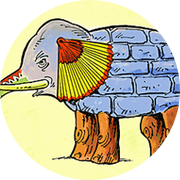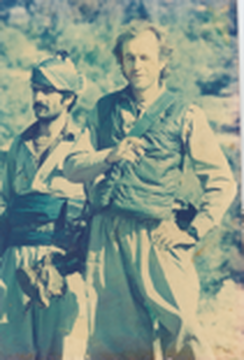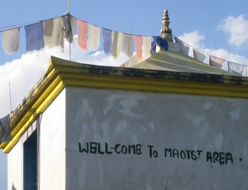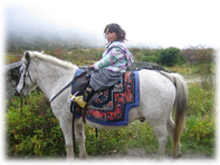| …But first to qualify my opinion as without qualification it could be nothing more than Tump-like spoutings, full of hot air but light on fact & experience. When people ask where I’m from, I truncate it to a village on the English South Coast but in truth, though I’ve visited it often, it’s a place I’ve never lived in. I grew up, privileged to be part of the conflict journalism community, a transient group of very tough, larger-than-life characters who cover the worst our world has to offer. I grew up in places many adults wouldn’t choose to visit, exposed to the quirks as well as some of the violence accompanying this. One foot in the West, another in the Not-so-West, but mostly inhabiting an uneasy though vibrant and chaotic no-man’s land. We travelled as part of the hardship bonus, and travelling in an intergenerational group opens up doors that otherwise you don’t often see. As my parents tell, during the bombings of Beirut in the early 80s, local militia groups would engage & offer advanced warning of incoming attacks to my mother, solely because she carried a curly, white-haired child with her. Later on, whilst guiding in the Nepalese Himalaya for a particularly diverse group of friends, our supposed family group was formally identified and welcomed in a greeting full of joy, exchanged at great volume across hilltops, this repeating over again from village to village. For in countries where your wealth is measured in people, to bring your children along offers an instant connection. It was later on in 2009, standing at a bedside in Kathmandu Model Hospital during the obligatory ward round where, quite poignantly, who we are was brought into sharp focus. An intern was presenting, rather awkwardly, a patient to the consultant and in a scene played out every day, in every hospital across the world, she spoke of an elderly woman brought in with abdominal pain and presumed cholecystitis, followed by the Universal Pause… The consultant began chastising, ‘Who is she? What is her caste? Where does she come from? If you don’t know this, how can you treat her? How do you know she will rest & not go back to farming? You cannot treat her properly if you don’t know these things…’ Indeed, we do the same with our own; juniors are proud to announce the name of a pet or great Aunt Lucy’s upcoming operation but when it comes to internationals there is a curious silence. The social history will be as brief as ‘tourist’ or ‘refugee’. We rapidly paper over vast complexities in part because it is too complex & time consuming but also perhaps because… were do we begin? ‘Who is she? What is her caste? Where does she come from? If you don’t know this, how can you treat her? How do you know she will rest & not go back to farming? You cannot treat her properly if you don’t know these things…’ The Sapir-Whorf Hypothesis, developed in the 60’s, suggests language itself shapes thinking. Subsequent interrogation by Winawer et al links the ability to label with the ability to identify and to distinguish between colours with greater dexterity (see figure 1) (2), in part our language allows us to see the world. Expounding on this, examination of the way culture impacts on the way we relate to our surroundings suggests that Westerners have an individualistic relationship with their environment, whilst Asians think more in terms of contextual relations, possibly as a result of historical and environmental pressures (3). Two vastly different approaches to what is in effect fairly similar lifestyles. How much more different must it be then for the Amazonian or desert bushman? Indeed, such are the distances traversed by certain Himalayan tribespeople, distance itself maybe described by some, not so much in units of time or geographical distance but in terms of numbers of meals consumed. It’s these fundamental paradigms in points of view that I find endlessly fascinating. In summary, we literally see the world differently and why does this matter? The nub of it is, as a profession, we all engage in medical tourism to a greater or lesser extent. This phenomenon is encouraged as far back as medical school where we venture forth to gain experience which otherwise would not be allowed to us, and to provide perceived assistance/knowledge to those with fewer resources. However, there is little time to become acquainted with surroundings and by definition we are unaware of our blinds spots. As Rumsfeld (former US Secretary of Defense) declared, ‘There are known knowns. These are things we know that we know. There are known unknowns. That is to say, there are things that we know we don't know. But there are also unknown unknowns. There are things we don't know we don't know.’ This last group is where we clash as we scratch our heads wondering why the other side just doesn’t get it? Whilst working in Western Africa I honestly spent a day trying to figure out why my patients were beginning to haul their mattresses onto the floor, a source of not inconsiderable consternation to the team. It arose that they were doing this out of increasing fear and the mattress removal was a more sensitive and less invasive marker of disease progression than the proposed alternative APACHE scoring system we were trying to formulate. Understanding this made it possible to overcome the health & safety concerns over nursing such patients. Navigating these complex social currents without context creates frustration and furthermore risks, as seen frequently in the non-government orgnisation (NGO) sector, project failure. Much like the ‘leave no trace’ ethos of camping we should seek to enhance, not fundamentally change the communities we’re working with, by addressing their needs from the inside out, as it’s their very diversity we are drawn to. Much as we value biodiversity, strength should be taken from social diversity and not just the more palatable, picture postcard aspects either - allowing, if you like for a medical version of the move from hard to soft environmental engineering. I was lucky with my first project, a Health & Hygiene program in Western Nepal, to spend a month undergoing cultural orientation & language classes prior to dispatch but even this didn’t cover all the problems that eventuated, some of which we were lucky to get out of without lasting harm. However, such intensity in cultural emersion is seldom possible but its undertaking opens up multiple avenues, for when faced with a family who has gathered all their monetary wealth together and run, carrying their dying on a makeshift stretcher, sometimes for days on end and in the desperate hope they will be saved, only then can the true scale of the situation be appreciated. In short, sometimes the social history is the only element that matters. References
|
| Kirsty O'Neill graduated from Edinburgh University with a BSc BioSci (Hons) and thesis in Malaria research. This led to work with UNICEF, Kathmandu, during their civil conflict and later prompted a move to Medicine. Having come to the UK via Nairobi, Beirut, and Moscow she continues to engage in working with charitable organisations, with a particular interest in Infectious Diseases & extreme environments. Projects include professional fundraiser & project conceptualisation for a UK disabilities charity, working with the Hmong Tribe in Northern Vietnam and more recently medical officer in an Ebola Treatment Hospital, Sierra Leone. |







 RSS Feed
RSS Feed
